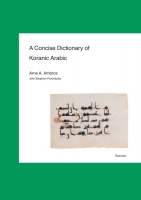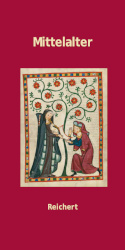Titelsuche
By Arne A. Ambros with the collaboration of Stephan Procházka
A Concise Dictionary of Koranic Arabic
2004
17,0 x 24,0 cm, 392 S., Gebunden
ISBN: 9783895004001
17,0 x 24,0 cm, 392 S., Gebunden
49,00 €
ISBN: 9783895004001
Kurze Beschreibung
Das Wörterbuch bietet das gesamte lexikalische Material im Koran mit englischen Glossen. Die Eintragungen werden durch selektive Belegstellen-Angaben und durch ausgewählte Textzitate ergänzt. Den Hauptteil vervollständigen zusätzliche Listen, so z. B. von Eigennamen, von syntaktischen Partikeln und von Wörtern in bestimmten Kategorien spezieller Bedeutung.Ausführliche Beschreibung
A ”Concise Dictionary of Koranic Arabic” is the first dictionary of its kind to appear in well over a century, i. e. after a stretch of time during which, thanks to the endeavors of both Muslim and western scholars, tremendous progress has been made towards the exact linguistic understanding of the Noble Koran, one of the most important texts of all humankind.This dictionary presents the entire Koranic lexical material in an easily accessible arrangement, with glosses in English based primarily, yet critically, on the German translation by R. Paret, with certain new proposals by the compiler. The entries are accompanied by a selective (in some instances, exhaustive) listing of their places of occurrence in the text and by the citation of a great number of relevant textual segments.
The main part of the dictionary, the ”Lexicon of Roots“, contains the nouns and verbs, arranged by their consonantal roots, as is traditional in Arabic lexicography. This is followed by a categorized list of ”Proper Names“, provided in order to enable the user to look up, e. g., which prophets, which scriptures or which pagan idols are mentioned in the text. The third section, ”Pronouns and Particles“, is meant to provide extensive information on the syntactic structure of the text; in it are listed all the lexical items that, because of not being root-derived, could not be included in the ”Lexicon of Roots“. As a special feature, ”Additions to the Lexicon from the Canonical Readings“ surveys the additional lexical material contained in the recognized variants (the so-called ”Seven Readings“) of the standard text.
A further feature of the dictionary is a listing of certain major and minor lexical problems arising during the close reading of the text.
The dictionary is supplemented by an extensive ”Appendix“. This contains various lists, some semantically, some morphologically defined, that appear to be of special interest, such as the nouns and noun-phrases referring to God, the numerals, the elative forms, the designations of Judgment Day and the names of the suras and their lengths.
The dictionary ends with a ”Bibliography“ of works of general importance, supplemented by an index referring the user to the great number of citations of special studies embedded in the individual articles.
The dictionary aims at reflecting the state of the art of Koranic philology, and so at providing both a guideline for the student of Arabic and Islamics and a research tool for the specialized scholar.
Rezensionen
„Nella chiarezza del suo impianto, nella precisione delle glosse, nell’essenzialità dei contenuti, il volume può dunque proporsi come un sussidio indispensabile per chiunque (specialista o meno) abbia qualche interesse ad accostare il Corano. Il vantaggio più immediato dell’opera è quello di offrire un materiale già selezionato del grande patrimonio arabo, permettendo al compilatore di approfondire da vari punti di vista gli aspetti specifici di lingua e di pensiero contenuti nel grande libro sacro e all’utente una ricerca mirata su di esso.“In: Salesianum. 71 (2009) 2. S. 404.
-------------------------------
„The length of this review should make it clear that Ambros’ dictionary is a major leap forward in Qur’anic studies, a book worthy of detailed discussion, and one that calls for reactions. Going through the dictionary, I had a feeling that something of note had happend, that some advance in the field had been made. And that is a rare feeling.“
In: Wiener Zeitschrift für die Kunde des Morgenlandes. Band 96 (2006). S. 438-444.
-------------------------------
„Das vorliegende handwerklich sehr sauber gearbeitete Handwörterbuch wird sich als nützliches didaktisches Hilfsmittel für die orientalistische Ausbildung bewähren, das auch dem Fachmann den erreichten Forschungsstand bequem darbietet, und wird so allen Ansprüchen gerecht, die man an ein Handwörterbuch stellen kann. Die Anhänge sind dazu geeignet, Hilfen und Impulse für die weitere Erforschung der arabischen Sprache und der koranischen Theologie zu geben.“
In: Orientalistische Literaturzeitung. 101 (2006) 3. Sp. 362-364.
Autoreninfo
Arne A. Ambros, born in Vienna, Austria. Received Dr. phil. (Ph.D.) from Vienna University, 1965. Called to the chair of Arabic at this university, 1974. Retired from active university service, 2003. Areas of current research: Koranic philology, Turkish (Ottoman and Modern), Maltese, Modern Irish.Stephan Procházka studied Arabic and Turkish at the Institute for Oriental Studies, University of Vienna, Ph.D. 1990, since 2000 Associate Professor in Vienna, 2003-04 fellow at the Institute for Advanced Studies in Jerusalem. Focus of research: Arabic dialectology.




 Vorwort
Vorwort

 Neuerscheinungen 2023/2024
Neuerscheinungen 2023/2024
 Gesamtverzeichnis 2023/2024
Gesamtverzeichnis 2023/2024
 Katalog Oriental Studies & Linguistics
Katalog Oriental Studies & Linguistics
 Mittelalter
Mittelalter
 Deutsche Inschriften
Deutsche Inschriften
 Musiktherapie
Musiktherapie
 Literaturen im Kontext
Literaturen im Kontext